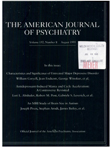Factors associated with recovery from and relapse into major depressive disorder in the elderly
Abstract
OBJECTIVE: This research examined demographic, clinical, and family factors in elderly depressed patients in order to ascertain which ones were related to the patients' recovery from and relapse into major depression. METHOD: One hundred twenty-seven elderly inpatients with a diagnosis of major depressive disorder according to the Research Diagnostic Criteria were evaluated at hospital admission and followed prospectively for 1 year. At the time of each patient's admission, the spouse or an adult child was also interviewed with measures that examined family-related issues. Recovery and relapse were determined according to explicit criteria from the Longitudinal Interval Follow-Up Evaluation. RESULTS: No demographic or clinical characteristics of the patients were predictors of recovery or relapse. Three family variables measured at the time of the patients' hospitalization were prospectively related to patients' status as not recovered at follow- up: the spouses' and adult children's psychiatric symptoms, their reported difficulties in caring for the depressed older patients, and their poorer physical health. However, relatives' reported difficulties with patient care were associated with reduced likelihood of relapse among the subgroup of patients who actually did recover. CONCLUSIONS: The findings are consistent with research in mixed-age samples that has documented the influence of interpersonal factors on the course of depression.
Access content
To read the fulltext, please use one of the options below to sign in or purchase access.- Personal login
- Institutional Login
- Sign in via OpenAthens
- Register for access
-
Please login/register if you wish to pair your device and check access availability.
Not a subscriber?
PsychiatryOnline subscription options offer access to the DSM-5 library, books, journals, CME, and patient resources. This all-in-one virtual library provides psychiatrists and mental health professionals with key resources for diagnosis, treatment, research, and professional development.
Need more help? PsychiatryOnline Customer Service may be reached by emailing [email protected] or by calling 800-368-5777 (in the U.S.) or 703-907-7322 (outside the U.S.).



